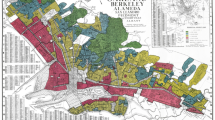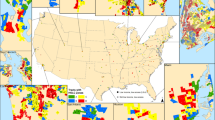Abstract
Aim
The present paper is an original research that explores housing satisfaction and residents’ ability to cope with day-to-day demands, taking into account other dimensions of housing and sociodemographic factors.
Subjects and methods
A cross-sectional survey (n = 562) was randomly administered to residents in three neighbourhoods (Labone, Asylum Down and Nima) in Accra, Ghana. The association between the outcome variables and housing attributes were analysed using logistic regression.
Results
The findings indicate that housing satisfaction was significantly predicted by age, with older people more likely to be dissatisfied with their housing arrangement. Respondents were dissatisfied with housing arrangements if they lived in Nima [odds ratio (OR) = 2.75, p < .001], Asylum Down (OR = 1.72, p < .01), crowded households (OR = 1.158, p < .05) or in compound houses (OR = 2.50, p < .001). In the context of housing attribute variables, respondent’s ability to cope with day-to-day demands was significantly associated to their income level. Odour annoyance as an indicator of housing condition emerged as a strong predictor of respondent’s inability to cope with daily demands with OR ranging from 1.68 to 2.33. Those who were dissatisfied with the location of their home as a place to live also reported poor coping abilities (OR = 1.86, p < .01).
Discussion and conclusions
From the findings, government policy on housing should encourage the construction of more affordable housing units to ease the crowding situation in Accra. There is also a need for the Accra City Council to provide clearer guidelines for both tenants and landlords in response to increasing tenancy disputes in context.
Similar content being viewed by others
References
Adams JS (1984) The meaning of housing in America. Ann Assoc Am Geogr 74:515–526
Awanyo L (2009) Meeting housing-space demand through in situ housing adjustments in the Greater Accra Metropolitan Area, Ghana. Environ Plann C Gov Policy 27:302–318
Baillie ST (1990) Dwelling features as intervening variables in housing satisfaction and propensity to move. Hous Soc 17:1–15
Dunn JR (2000) Housing and health inequalities: review and prospects for research. Hous Stud 15(3):341–366
Dunn JR (2002) Housing and inequalities in health: a study of socioeconomic dimensions of housing and self reported health from a survey of Vancouver residents. J Epidemiol Community Health 56:671–681
Ellaway A, Macintyre S (1998) Does housing tenure predict health in the UK because it exposes people to different levels of housing related hazards in the home and its surroundings? Health Place 4:141–150
Evans GW, Wells NM, Moch A (2003) Housing and mental health: a review of the evidence and a methodological and conceptual critique. J Soc Issues 59:475–500
Ghana Real Estate Development Association (GREDA) GREDA seeks more partnership to house Ghanaians. Available via http://news.myjoyonline.com/business. Accessed 1 Oct 2009
Ghana Statistical Service (2002) 2000 Population and housing census. Special Report on Urban Localities, Accra, Ghana
Ginsberg Y, Churchman A (1984) Housing satisfaction and intention to move: their explanatory variables. Socioecon Plann Sci 18:425–431
Grant R, Yankson P (2003) City profile: Accra. Cities 20:65–74
Konadu-Agyemang K (2001a) Structural adjustment programs and housing affordability in Accra, Ghana. Can Geogr 45:528–544
Konadu-Agyemang K (2001b) A survey of housing conditions and characteristics in Accra, an African city. Habitat Int 25:15–34
Krieger J, Higgins DL (2002) Housing and health: time again for public health action. Am J Public Health 92(5):758–768
Lu M (1998) Analyzing migration decisionmaking: relationships between residential satisfaction, mobility intentions, and moving behavior. Environ Plan A 30:1473–1495
Lu M (1999) Determinants of residential satisfaction: ordered logit vs. regression models. Growth Change 30:264–287
Macintyre S, Ellaway A, Der G, Ford G, Hunt K (1998) Do housing tenure and car access predict health because they are simply markers of income or self esteem? A Scottish study. J Epidemiol Community Health 52:657–664
Nathan V (1995) Residents’ satisfaction with the sites and services approach in affordable housing. Hous Soc 22(3):323–344
O’Rourke D, Blair J (1983) Improving random respondent selection in telephone surveys. J Mark Res 20:428–432
Sinai I (2001) Moving or improving: housing adjustment choice in Kumasi, Ghana. Hous Stud 16:97–114
Smith SJ, Easterlow D, Munro M, Turner KT (2003) Housing as health capital: how health trajectories and housing paths are linked. J Soc Issues 59(3):501–525
Tipple GA (1987) Housing policy and culture in Kumasi, Ghana. Environ Behav 19:331–352
Ukoha OM, Beamish JO (1997) Assessment of residents’ satisfaction with public housing in Abuja, Nigeria. Habitat Int 21:45–460
Wrigley N (1985) Categorical data analysis for geographers and social scientists. Longman, New York
Yeboah I (2000) Structural adjustment and emerging urban form in Accra, Ghana. Afr Today 47:61–89
Yeboah I (2005) Housing the urban poor in twenty-first century Sub-Saharan Africa: policy mismatch and a way forward for Ghana. GeoJournal 62:147–161
Acknowledgements
This research was conducted with the financial support of the University of Western Ontario Start-up Fund. Thanks to the anonymous referees for their feedback. Special thanks to research assistants from the Department of Geography, University of Ghana, Legon who administered the survey. None bear any responsibility for the arguments presented here.
Conflict of interest
The authors confirm that there are no relevant associations that might pose a conflict of interest.
Author information
Authors and Affiliations
Corresponding author
Rights and permissions
About this article
Cite this article
Baiden, P., Arku, G., Luginaah, I. et al. An assessment of residents’ housing satisfaction and coping in Accra, Ghana. J Public Health 19, 29–37 (2011). https://doi.org/10.1007/s10389-010-0348-4
Received:
Accepted:
Published:
Issue Date:
DOI: https://doi.org/10.1007/s10389-010-0348-4




